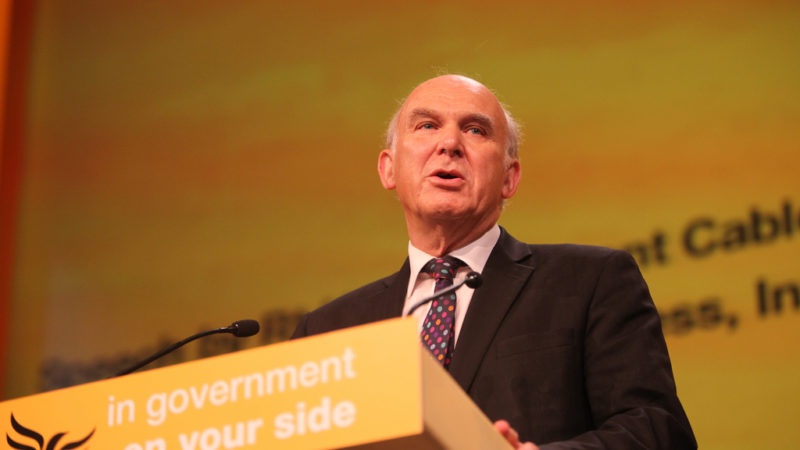The road to health is paved with good intentions...

Pic: The Lib Dems have a tricky record when it comes to the NHS…
The airwaves were jam-packed with good intentions yesterday. A cross-party group of politicians and experts released their report on the future of NHS funding – and came out with a bold recommendation.
No one can deny the scale of the problem the NHS faces. The report – written for the Liberal Democrats – notes the NHS in England needs a rise in real-terms funding of at least £4bn in 2018-19. That was the call of the NHS England Chief Executive and leading think tanks ahead of the November 2017 budget.
And this needs to be sustained: there is no one year fix. The authors recommend inflationary rises in subsequent years.
But how do you fund it?
This is the key question of the report – and though they nobly attempt to answer it, the authors’ recommendations risk doing more harm than good.
The authors recommend “bringing together health and care funding in a single, ring-fenced tax which
would replace National Insurance” – a convoluted way of saying ring-fencing National Insurance for the NHS.
While it’s welcome that experts are looking at ways of saving our desperately under-funded NHS, there’s a problem with this plan.
Currently around 80% of NHS funding comes from general taxation: the main tax pot. General taxation is the most efficient way of raising money – it has very low overheads (basically everyone pays tax) relative to the money raised.
But there’s another crucial reason: general taxation is the most equitable approach to funding. Tax is progressive: companies and individuals with more income and wealth pay more; financial and health risks are pooled, so sick people do not pay more than those who are well. While the general income tax bands aren’t great, the rich pay more as a percentage.
The reverse is true for National Insurance: the richer you are, the less you pay as a percentage. Income over the Upper Earnings Limit (UEL) of £3,863 per month is taxed at just 2% in NI.
That compares to 12% for most people earning below that rate. In contrast, those earning over £150,000 pay a 45% income tax rate in the UK.
So switching NHS funding from general taxation to National Insurance would make NHS funding more regressive – potentially equating to a tax cut for the wealthiest, and conversely reducing support for a publicly-funded NHS among the majority of people.
Much of taxation is about perceptions. We all know that National Insurance and income tax basically fall into the same pot: they are both treated as tax and, by the Treasury, wads of money to spend.
But when the funding for services moves from a tax where those with the broadest shoulders carry the most, to one where the poorest are hit hardest, we must think carefully about the effect on morale – i.e. people’s willingness to cough up.
The implications are potentially serious: if you move a service from universal, egalitarian funding, to one where the poor bear the most brunt, you risk reducing general support.
As Carol Ackroyd, spokesperson for Keep our NHS Public, said yesterday:
“NI is a regressive tax since there is a cap on the top contribution, NI contributions stop when the individual reaches pension age, and contribution levels are not related to ability to pay. The level of benefits paid out is related to the NI contributions an individual has made.
“Every year or so, there are renewed calls from right wing politicians in all parties to fund the NHS through a hypothecated National Insurance tax. The public rationale for such a tax is that it is a way of safeguarding NHS funding into the future, and protecting the NHS from general austerity measures.
“This is nonsensical for reasons set out above, and particularly in rejecting the additional income provided by those with more wealth that comes through general taxation. However the public justification also hides some very real dangers of funding through a separate National Insurance payment.
“Politicians on the right – in all parties – have made no secret of their preference for private-insurance-based healthcare. Separating out healthcare taxation from other taxes would make it much easier for a future government to make access to healthcare dependent on the level of NI payments made, or for instance, to allow exemption from NHS NI contributions if, for instance, individuals opted for private health insurance.”
She added:
“There would be plenty of money to fund the NHS if corporations were taxed fairly and not allowed to hide profits in offshore tax havens.”
What appears to be the rallying cry of a new centrist party looks suitably uninspiring. Both the policy and the party look set to flop before they’ve even properly launched…
Josiah Mortimer is Editor of Left Foot Forward. Follow him on Twitter.
Left Foot Forward doesn't have the backing of big business or billionaires. We rely on the kind and generous support of ordinary people like you.
You can support hard-hitting journalism that holds the right to account, provides a forum for debate among progressives, and covers the stories the rest of the media ignore. Donate today.



